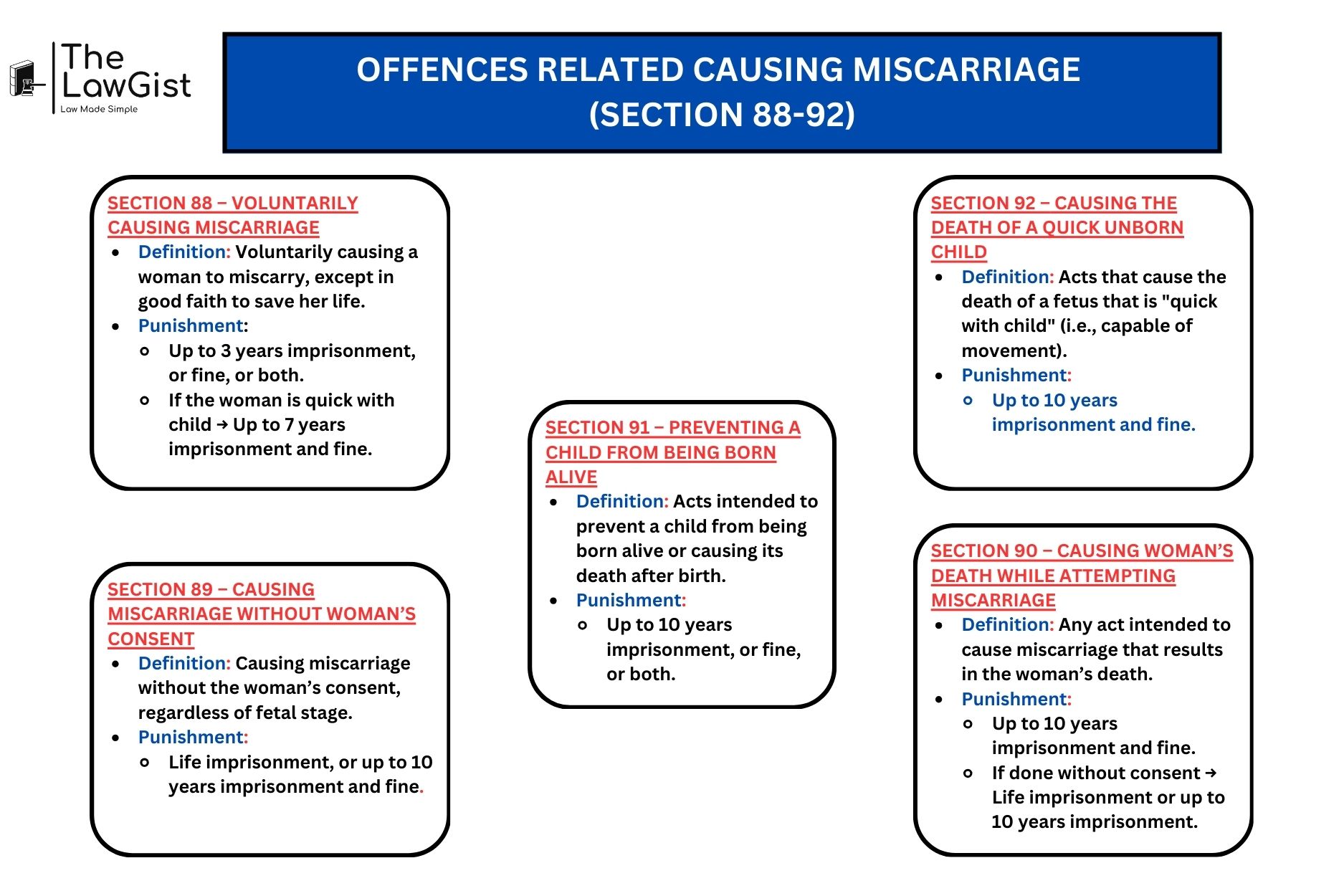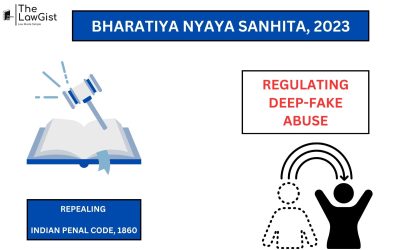Section 88 – Voluntarily Causing Miscarriage (EARLIER Section 312)
What is Section 88?
Section 88 criminalizes the act of voluntarily causing a pregnant woman to miscarry unless it is done in good faith to save her life. The law also includes cases where a woman causes her own miscarriage.
- If miscarriage is not caused in good faith to save the woman’s life, it is punishable.
- If the woman is quick with child (fetus has perceptible movement), stricter punishment applies.
Punishment
- Up to three years imprisonment, or fine, or both.
- If the woman is quick with child, the punishment extends to seven years imprisonment and fine.
Landmark Case
Suchita Srivastava vs. Chandigarh Administration (2009) – In this case, Supreme Court emphasized the right of a woman over her reproductive choices, allowing abortion in certain circumstances under the Medical Termination of Pregnancy (MTP) Act.
Objective
Section 88 protects pregnant women from forced miscarriages while balancing the legal allowance for abortion under medical necessity.
Section 89 – Causing Miscarriage Without Woman’s Consent (EARLIER Section 313)
What is Section 89?
Section 89 criminalizes causing miscarriage without the consent of the pregnant woman, irrespective of whether she is quick with child or not.
- The act of miscarriage without the woman’s consent is considered more severe.
- Punishment is stricter than Section 88 due to lack of consent.
Punishment
- Imprisonment for life or up to ten years imprisonment and fine.
Landmark Case
Murugan Nayakkar vs. Union of India (2017) – In this case, Supreme Court upheld a woman’s autonomy in deciding whether to terminate her pregnancy, highlighting the importance of consent.
Objective
Section 89 ensures a woman’s right to bodily autonomy by strictly penalizing forced miscarriage.
Section 90 – Causing Woman’s Death While Attempting Miscarriage (EARLIER Section 314)
What is Section 90?
Section 90 criminalizes any act done to cause a miscarriage that results in the death of the woman.
- If a woman dies due to an act intended to cause miscarriage, the offender is liable.
- If the act was done without the woman’s consent, harsher punishment applies.
Punishment
- Up to ten years imprisonment and fine.
- If done without consent, punishment extends to life imprisonment or as per the above terms.
Landmark Case
V. Krishnan vs. State of Tamil Nadu (2005) – In this case, Supreme Court upheld strict liability for illegal abortions resulting in a woman’s death.
Objective
Section 90 acts as a deterrent against reckless or forced abortion practices that endanger a woman’s life.
Section 91 – Preventing a Child from Being Born Alive (EARLIER SECTION 315)
What is Section 91?
Section 91 punishes any act done before a child’s birth to prevent it from being born alive or causing its death after birth unless done in good faith to save the mother.
- It protects the unborn child’s right to life.
- Exceptions exist when done to save the mother’s life.
Punishment
- Up to ten years imprisonment, or fine, or both.
Landmark Case
K.M. Nanavati vs. State of Maharashtra (1961) – In this case, the Supreme Court stated that the case set precedent for criminal intention in homicide, influencing laws on fetal rights.
Objective
Section 91 ensures protection for unborn children from deliberate harm while allowing exceptions for maternal safety.
Section 92 – Causing the Death of a Quick Unborn Child (EARLIER SECTION 316)
What is Section 92?
Section 92 criminalizes acts that cause the death of a fetus that is quick with child (showing movement), considering it akin to culpable homicide.
- Killing a developed fetus is treated as a serious offence.
- Even if the act does not result in the mother’s death, it is still punishable.
Punishment
- Up to ten years imprisonment and fine.
Landmark Case
Nikhil Datar vs. Union of India (2008) – In the case, Supreme Court addressed fetal rights and the need for legal abortion access.
Objective
Section 92 protects unborn children from harm while imposing liability for reckless actions that lead to fetal death.
QUICK SUMMARY- OFFENCES RELATED CAUSING MISCARRIAGE (SECTION 88-92) |
|
SOURCE – MINISTRY OF LAW AND JUSTICE
FAQs- OFFENCES RELATED CAUSING MISCARRIAGE (SECTION 88-92)
- What is the punishment for voluntarily causing miscarriage under Section 88?
Section 88 prescribes up to 3 years imprisonment, or fine, or both. If the woman is quick with child, the punishment extends to 7 years imprisonment and fine. - How does Section 89 differ from Section 88 regarding miscarriage?
Section 89 deals with miscarriage caused without the woman’s consent and imposes a stricter punishment of life imprisonment or up to 10 years imprisonment and fine. - What is the legal consequence if a woman dies due to an attempt to cause miscarriage (Section 90)?
If a woman dies due to an act intended to cause miscarriage, the offender faces up to 10 years imprisonment and fine. If done without consent, the punishment extends to life imprisonment. - What does Section 91 say about preventing childbirth?
Section 91 criminalizes acts intended to prevent a child from being born alive or causing its death after birth, punishable by up to 10 years imprisonment, or fine, or both. - How is the death of a quick unborn child treated under Section 92?
Section 92 treats causing the death of a quick unborn child as a serious offence, prescribing up to 10 years imprisonment and fine, similar to culpable homicide.








